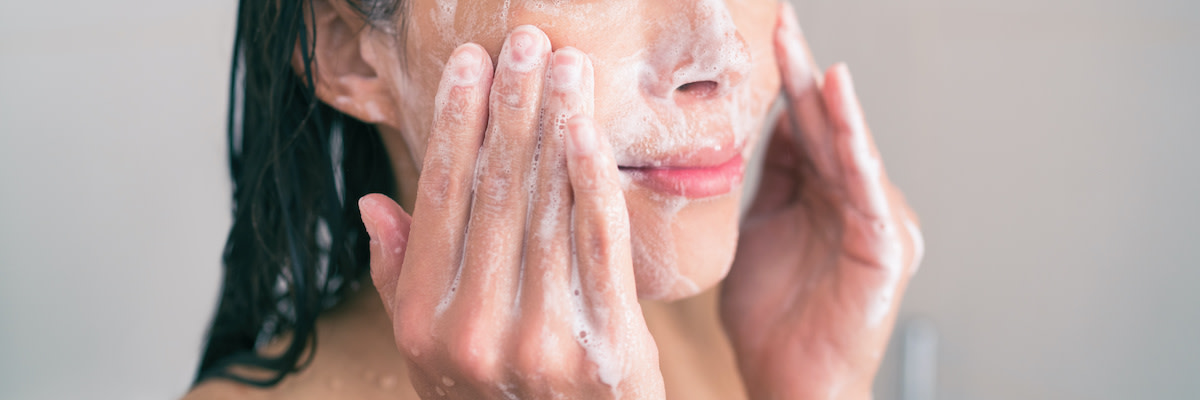AHA vs. BHA: Differences Between the Skincare Exfoliants
Written by MasterClass
Last updated: Sep 15, 2021 • 3 min read
AHAs and BHAs are two types of chemical exfoliation ingredients included in skincare products that can lead to cleaner, healthier skin. Learn about the ingredients along with their distinguishing characteristics.
Learn From the Best
What Are AHAs?
AHAs (or alpha hydroxy acids) are chemical exfoliants derived from milk or sugar (usually sugarcane or fruit). They are water-soluble, working at the surface level of your skin to break down the “glue” that holds your skin cells together and remove dead skin cells for potentially smoother, clearer skin and a hydrating or moisturizing effect. They may also increase collagen production, a key factor in reducing fine lines for an anti-aging effect. They’re a common choice for people with dry skin since they don’t remove oils from your pores.
The two most common types of AHAs are glycolic acid and lactic acid; others include citric acid, mandelic acid, tartaric acid, malic acid, and the antioxidant phytic acid.
What Are BHAs?
BHAs (or beta hydroxy acids) are chemical exfoliators derived from tree bark and leaves. They are oil-soluble, which means they can penetrate deeper into your skin and help remove dead skin cells and unclog your pores, making them a common choice for people with oily skin or skin conditions like acne-prone skin, dark spots, or sebum buildup. They may also increase collagen density, which can help reduce the appearance of fine lines for an anti-aging effect.
Common BHAs include salicylic acid and willow bark.
AHA vs. BHA: Differences Between the Exfoliating Acids
AHAs and BHAs are both helpful exfoliating acids in skincare routines used after a cleanser to exfoliate, brighten, and hydrate the skin for a healthier look. However, there are several differences between these ingredients:
- Concentrations: Products that use AHAs as an active ingredient typically have higher concentrations, between four and ten percent, to get the exfoliating effects. BHA products, on the other hand, typically only come in concentrations of one or two percent.
- Gentleness: AHAs are a stronger exfoliant, which means they can irritate sensitive skin, while BHAs are more gentle and safer for sensitive skin or rosacea, a skin condition that causes a persistent redness in the center of the face.
- Pigmentation uses: AHAs and BHAs can have different effects for users with more pigmentation or darker skin tones. AHAs can trigger post-inflammatory hyperpigmentation, while BHAs can alleviate spots and smooth out an uneven skin tone.
- Skin type uses: AHAs and BHAs work best with different skin textures. AHAs work only at the top layer of the skin, so they don’t remove oil from the pores below and, as such, are a more popular choice for those with dry skin. BHAs work down in the pores to remove oils, making them a popular choice for those with oily skin or skin concerns like acne breakouts, blackheads, blemishes, or sebum buildup, especially when paired with a moisturizer or lotion.
- Solubility: AHA exfoliants are water-soluble, meaning they can only work at the skin’s surface to break down dead skin cells and exfoliate. However, BHA exfoliants are oil-soluble, which allows them to penetrate deeper into the skin and unclog pores.
- Sources: AHAs derive from milks and sugars, while BHAs derive from botanicals like tree bark and leaves.
- Sun effects: AHAs can increase your skin’s photosensitivity, making it more sensitive to sun damage. As a result, consider pairing AHA use with a protective sunscreen. BHAs do not have the same photosensitivity effects.
Before Starting a New Skincare Regimen
Individuals experience different levels of sensitivity to ingredients found in various skincare products. To prevent adverse reactions, consult a dermatologist before applying a new product to your skin. This article is for educational and informational purposes only and is not a substitute for professional medical advice.
Learn More
Get the MasterClass Annual Membership for exclusive access to video lessons taught by the world’s best, including Bobbi Brown, RuPaul, Tan France, and more.
